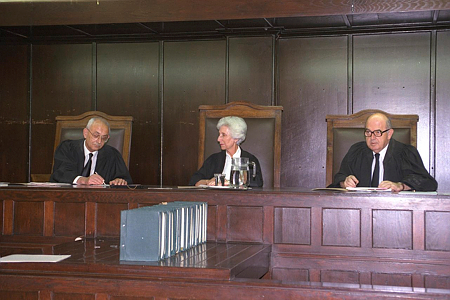Supreme Court Justice Shoshana Netanyahu Is Born in Danzig

April 6, 1923
Retired Israeli Supreme Court Justice Shoshana Netanyahu (Shenburg) is born in Danzig (then a free city, today Gdansk, Poland). When she is only 1 year old, her family makes aliyah, settling in the Bat-Galim neighborhood of Haifa. After completing high-school in Haifa, Shoshana continues her studies at the School of Law in Jerusalem, which had been established in December 1920 by the Attorney General of Mandatory Palestine, Norman Bentwich as the first legal training institute in the Land of Israel. Shoshana completes her law study in 1947 and enters into private practice. During the 1948-1949 War of Independence, her private practice work is briefly interrupted as she volunteers to serve as Deputy Judge, Advocate General for the fledgling Israeli Air Force.
After the war, she marries Elisha Netanyahu, a mathematics professor at the Technion and the uncle of Benjamin and Yoni Netanyahu and resumes her private practice work eventually focusing on maritime law.
In 1969 she is appointed as a Judge to the Magistrate’s Court in Haifa and in 1974 she becomes a Judge of the District Court in Haifa. She remains in that position until December 1981 when she is selected to serve as an acting Supreme Court Justice. While her acting justice appointment is scheduled to end in March 1932, she is officially nominated to the Court by the Judges Appointment Committee in June 1982, becoming the second woman to serve on the court.
As a Supreme Court Justice, Netanyahu pursues equality and justice for citizens, along with honest and fair actions of administrative authorities. On June 5, 1988, the government establishes a National Judicial Commission of Inquiry to investigate the country’s healthcare system and make recommendations for its improvement. Shoshanna is appointed as chairperson of the five member committee by Supreme Court President Meir Shamgar. The commission spends more than two years interviewing over 150 individual witnesses and international experts and gathering data from numerous documents and reports. The majority report, which is 460 pages, includes the following recommendations: decentralizing and depoliticizing public health funds, uniform salaries for hospital personnel in corresponding positions and compulsory health insurance for all citizens.
Netanyahu retires from the Court on April 4, 1993. Upon her retirement, Shamgar states, “She worked to clarify and advance the legal process in several important areas, generally in civil law involving individuals.”